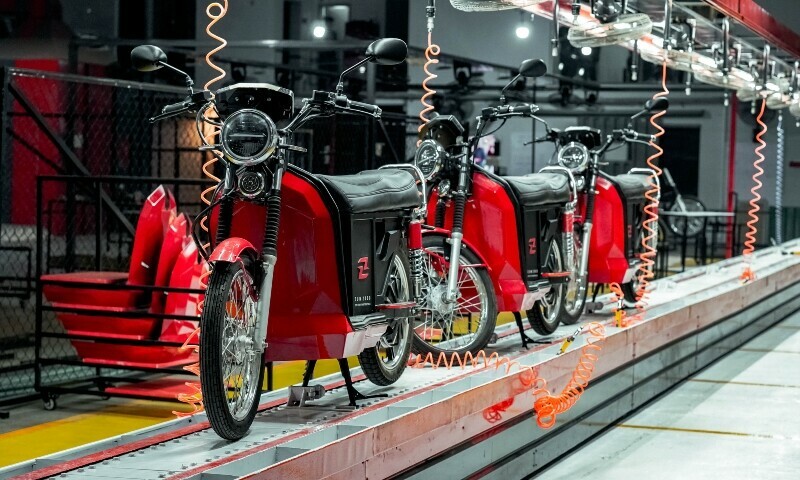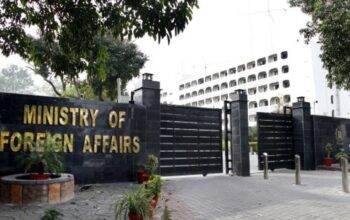By Staff Reporter
ISLAMABAD: The government on Thursday rolled out its Electric Vehicle (EV) Policy 2025-30, pledging more than Rs100 billion in subsidies over the next five years to push electric bikes and rickshaws into the mainstream.
The announcement signals a bold step to tackle the country’s crippling air pollution and slash its reliance on imported fuel, as Chinese and Korean EV brands gain traction in a market long ruled by Japanese automakers.
The policy zeroes in on two- and three-wheelers, aiming to make electric mobility affordable for millions. “Total subsidy over five years will be over Rs100 billion and it will basically be focused on the two-and-three wheelers,” Haroon Akhtar Khan, a senior aide to Prime Minister Shehbaz Sharif, told reporters at a news conference. “We will have subsidized financing for 116,053 electric bikes, 3,171 rickshaws.”
To jumpstart the plan, Rs9 billion is already earmarked in the 2025-26 budget. In a nod to gender equity, the government has carved out a 25% quota for women, hoping to boost their access to transport. The stakes are high: Pakistan’s cities, Islamabad, Lahore, and Karachi among them, rank among the world’s most polluted, with exhaust-belching vehicles a prime culprit.
Pakistan’s roads tell a story of change. Japanese brands have long held sway, but Chinese and Korean EV makers are muscling in. Today, the country counts 70,000 electric motorcycles, 5,200 electric cars, and 450 electric buses. To fuel this shift, the government has handed out 61 manufacturing licenses for electric two- and three-wheelers, including bikes and rickshaws.
Yet hurdles loom large. Khan admitted the country’s EV charging network is thin, and safety and quality standards lag. “We have to make sure that if anybody is manufacturing an electric vehicle there are no emissions,” he said, stressing that proper battery disposal is critical to avoid trading one environmental mess for another.
The government’s betting big on payoffs. Khan projected annual savings of Rs283 billion ($1 billion) in fuel costs and a 4.5 million-ton drop in carbon emissions. That’s alongside cutting fuel use by 2.07 billion liters a year—worth about $1 billion in foreign exchange—and trimming health costs by $405 million annually. Over five years, the policy could save Rs800 billion through lower fuel imports, cheaper electricity, and carbon credit revenue, with credits alone potentially worth Rs15 billion.
Charging EVs with surplus grid power could also shrink capacity payments from Rs174 billion to Rs105 billion, Khan noted. The total energy demand—126 terawatt-hours over five years—can be met without straining the system.
“This policy should be embraced wholeheartedly by Pakistan, as it is a game-changer for our economy, environment, and industrial landscape,” Khan said. He framed it as a strike against climate change and a boost to industrial growth, not just a green experiment.
This isn’t Pakistan’s first swing at EVs. The 2019 National Electric Vehicles Policy set a target of 30% electric passenger cars and heavy trucks by 2030, with a loftier 90% goal by 2040. The new policy doubles down, aiming for 30% of all new vehicles to be electric by 2030. To get there, it’s rolling out testing rules, safety standards, and emission guidelines, plus a digital platform for transparent subsidy handouts.
Infrastructure’s getting a lift too: 40 new charging stations will dot motorways every 105 kilometers, while battery swapping and vehicle-to-grid systems are in the works. New building codes will mandate charging points, easing adoption in cities.
Pakistan’s already making over 90% of two- and three-wheeler parts at home, and the government wants more. Tax breaks on EV components and incentives under the AIDEP tariff facility—extended to 2026, then phased out by 2030—are on offer. Small and medium enterprises will get tailored support to keep production local.
Customs duties and sales taxes on EV parts are also waived, sweetening the deal. “This is a historic step toward clean, affordable, and sustainable transportation,” Khan said, calling on federal and provincial governments, businesses, and citizens to rally behind it.
Copyright © 2021 Independent Pakistan | All rights reserved




